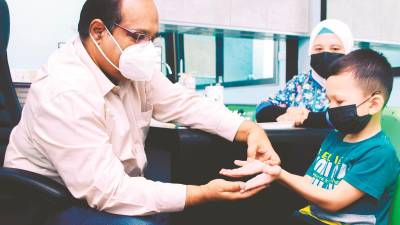PETALING JAYA: The Malaysian Medical Association (MMA) has unveiled its wishlist for Budget 2026, calling for bold reforms in healthcare financing, workforce retention, digitalisation and elderly care, adding that health must be viewed as an investment, not an expenditure.
Its president Datuk Dr Thirunavukarasu Rajoo said Malaysia must double its public healthcare spending from the current 2.4% to 5% of the GDP to meet rising demands and close critical service gaps.
To fund this, the MMA proposed removing the sugar subsidy and expanding the sugar tax on sweetened drinks, with the revenue ring-fenced for the Health Ministry.
“This not only discourages unhealthy consumption but also strengthens our healthcare system.”
He also suggested raising registration fees at public clinics, from RM1 to RM5 for primary care and from RM5 to RM25 at specialist outpatient clinics, with proceeds channelled into facility maintenance, while maintaining B40 exemptions.
He said the most urgent priority for Budget 2026 is addressing severe shortages and retention challenges in the public healthcare workforce.
He welcomed the government’s move to abolish the contract doctor system and urged that all remaining contract doctors be absorbed into permanent positions.
“Without a strong workforce, even the best policies cannot be delivered effectively,” he said, adding that
on-call allowances for doctors should be raised from RM9.16 to RM25
per hour to reflect their workload.
To ensure fair distribution of healthcare personnel nationwide, he proposed creating a national dashboard to map healthcare workers, facilities and resources across the country.
“This would allow better planning, transparency and workload management.”
He also urged that digitalisation be made a central pillar of
healthcare reform.
“It is unacceptable that some hospitals still have ‘dead zones’ without phone connectivity.”
He called for nationwide standardisation of patient ID stickers to reduce errors, and for improvements to the MySejahtera app to provide more personalised care while mapping private GP clinics participating in public–private collaborations.
Thirunavukarasu said Budget 2026 should offer more grants for clinics, pharmacies and dental practices to support digital upgrades under the 13th Malaysia Plan, adding that such investments would modernise healthcare delivery and strengthen patient continuity.
Citing that non-communicable diseases cost Malaysia an estimated RM64.2 billion in 2021, or 4.2% of GDP, largely from productivity loss, he said prevention must be made a national priority.
He recommended funding preventive screenings in private clinics and outsourcing health checks for civil servants, university entrants and national immunisation programmes to private GPs.
“This would ease pressure on public facilities while maintaining secure record-keeping through MySejahtera.”
He also called for stronger policies to promote healthy living, including mandatory calorie labelling at food outlets, healthier school meals and tax relief for Malaysians adopting active lifestyles through gym memberships or sports activities.
With elderly care costs projected to reach RM21 billion by 2040, Thirunavukarasu said Budget 2026 must start preparing for an ageing population.
He proposed greater investment in home-based care, more geriatric and palliative specialists and upgrades to hospitals and clinics with age-friendly facilities.
Financial support for seniors, including subsidies, micro-insurance and caregiver training, should also be expanded.
To address manpower shortages and wait times, he suggested offering tax incentives for private hospitals to lend diagnostic equipment after office hours and formalising
GP–health clinic–hospital clusters under a dedicated fund.
He also called for a review of the outdated PHFSA Act to improve governance and integration between public and private sectors.
He said the Covid-19 pandemic proved that collaboration works.
“GP–MOH cooperation delivered one of the highest vaccination rates in the world. That success must be replicated in our national health programmes.
“With fairer funding, stronger partnerships and better planning, Malaysia could save billions in productivity losses while improving quality of life. Health is not an expenditure, it is an investment in the nation’s future.”
